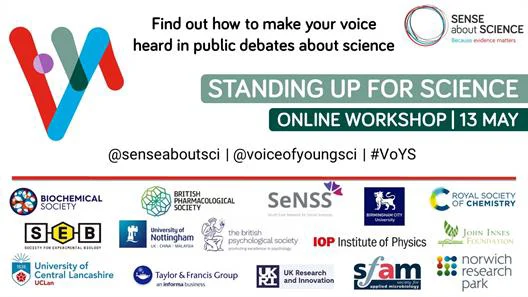Standing up for Science: Communication for interdisciplinary researchers
Posted by: Catherine Naughtie

Having the skills to communicate outside academic channels is a key component of the early career researcher’s toolbox. However, this task has added dimensions when you are working in inter-disciplinary contexts or dealing with controversial topics. Therefore, it is vital to develop the skills to effectively communicate complex research clearly and accurately to the public, policymakers, and other non-academic stakeholders.
I recently took part in a Sense About Science workshop providing training for early career researchers as part of their Voice of Young Science network. A range of expert panellists from journalism, policymaking, and academia shared tricks and tips to get your voice heard and maximise the real-world impact of your research.
Here are 5 useful takeaways from the session:
- Be brave
As an early career researcher, particularly one working in an interdisciplinary field, it can be easy to focus on what you “don’t know” and struggle to see yourself as an expert. However, the work we undertake as PhD students is – by necessity – at the cutting edge and we will all become experts in our research niche throughout our studies.
2. Simplify
Be cognizant of the level of explanation that’s expected, as it is often much more basic than you are used to! Remember that you know more about your general topic than 90% of the public, and it is the public that you are targeting with science communication. Often the level of explanation required is at an advanced school or undergraduate level, so you will not be out of your depth.
3. Develop relationships
It is useful to identify and build relationships with local media and specialist journalists working in your area – for instance, specialist environment or energy correspondents. They are passionate about their sectors and will often respond to well-pitched story ideas.
The University of Bath public engagement unit can provide an array of training opportunities and advice on getting started with research communication and making relevant contacts.
4. Prepare
Put some time into developing condensed 2-3-minute summaries of the main issues in your research and think about how you might relate your research to current affairs. Stakeholders are unlikely to engage with you if you can’t express yourself succinctly or you don’t respond quickly, being prepared will help you feel confident contributing at short notice.
5. Don’t feed the trolls
Publicly commenting on contentious topics, such as climate change, can result in backlash. Remember that you don’t have the obligation to acknowledge or reply to hostile messages on social media. It can be better to ask friends or fellow researchers to reply to negative comment threads on your behalf, rather than wading in yourself. This is a tactic used successfully by many researchers and research organisations working on controversial topics.
Hopefully, these tips will inspire you to step up your public engagement work and share your research beyond academic channels.